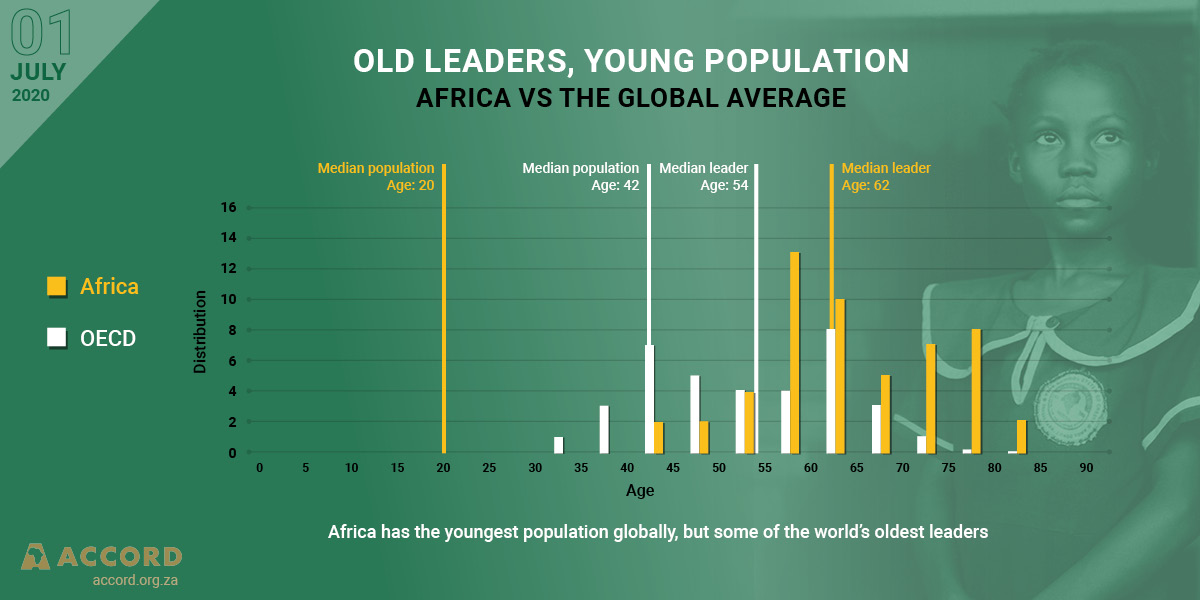It has been more than 130 days since the first reported case of coronavirus (COVID-19) in Africa. When many were still trying to comprehend the outbreak of COVID-19, at the African Union (AU) we immediately adopted the ‘new normal’. As early as 23 March, we started convening the Virtual AU Youth Consultations Series on COVID-19, aimed at collective youth response, in collaboration with the Africa Centres for Disease Control and Prevention (Africa CDC). Through this, we briefed, engaged and enabled young people with information and platforms to develop youth-led responses.
For young people, this is not just a health crisis but also a governance crisis, where they demand intergenerational co-leadership in decision-making, negotiation tables and community responses.
Tweet
The 13 consultations we convened with over 400 youth from 42 African countries were eye-opening on both the challenges and innovations by African youth in fighting the virus. Indeed, African youth have shown unprecedented leadership during the pandemic, putting their energies, dynamism and innovation into the fight to curb the spread of the pandemic. For instance, some youth organisations turned their offices into laboratories for producing hand sanitizers, like Local Youth Corner Cameroon. Others shifted gears to produce protective face masks, such as Tiwale in Malawi during its sewing workshops with community graduates. Some have raised awareness, like Tazama World Media Kenya and Youth Voices Rwanda; others have been providing palliatives for households in underserved communities, such as Food and Genes Initiative Nigeria; and young engineers and tech gurus have been crowdfunding and developing apps. Indeed, we have also seen young professionals who are scientists and health workers at the frontline of combating the virus.
As I briefed the African Ministers on Youth a few weeks ago, the two main concerns of youth are jobs and food security. The COVID-19 pandemic is having an unprecedented impact on educational systems as school closures and employment shortfalls continue, exacerbated by the health crisis and digital divide. In addition, youth in informal settlements and refugee camps have emphasised the increase in human rights violations in terms of access to basic needs, as well as police violence.
We listened to youth saying: “I may die of hunger and malnutrition, but not of COVID-19.” Others told us: “For me, it is the same to drown in the Mediterranean, join violent extremist group or die with coronavirus, because I do not enjoy basic rights anyway as a young person.”
For young people, this is not just a health crisis but also a governance crisis, where they demand intergenerational co-leadership in decision-making, negotiation tables and community responses. African ministries should work with youth campaigners who know how to disseminate information and can help our traditional bureaucratic institutions to digitise. Youth response should be an integral part of national efforts and plans to fight COVID-19 by recognising youth innovations and certifying their prototypes to ensure they can scale up and go to market.
Following these consultations, African youth have demanded direct engagement, communication and dialogue with decision-makers. Therefore, we pioneered a series of eight Public Intergenerational Dialogues with African leaders where AU commissioners, special envoys, AU organs and regional economic communities (RECs) engaged directly with youth around their concerns and answered their questions while we secured commitments and calls to action. Accordingly, the Africa CDC director committed to support the “youth-led movement against COVID-19 in Africa to sensitise the public and despair false information and fake news”, while Dr Ngozi Okonjo-Iweala, AU Special Envoy on COVID-19, committed to young people to “continue pushing for internal and external additional resources in the fight against COVID-19 and demand accountability and transparency for the use of the same”.
There is a need to put in place youth recovery funds with stimulus packages and subsidies for youth, especially favouring the informal sector. Such a need is more pressing for young women, in particular – if they are not economically empowered, they are more vulnerable to power dynamics during the pandemic, where they could be offered food and care only to be subjected to abuse.
On the agenda of Youth, Peace and Security (YPS), 2020 is a pivotal year for the actualisation of the AU theme of ‘Silencing the Guns: Creating Conducive Conditions for Africa’s Development’. In May 2013, the AU Heads of State and Government pledged to silence the guns and “not to bequeath the burden of conflict to the next generation of Africans and undertake to end all wars by 2020”. Young people should be at the centre of this agenda, since the continent has the youngest population in the world – with 65% under the age of 35 years – and they are the most affected by conflict.
I urge African leaders to translate the 33rd AU Summit commitments into concrete impacts on the lives and livelihoods of Africa’s youth, especially as they prepare to reconvene during the Extraordinary Summit and the 2nd Mid-Year Coordination Meeting between the AU and the RECs. I further call on youth in Africa to get engaged in continental mobilisation to end violence and all threats, including the current pandemic, and to continue to show Africa’s leadership, and that despite the scepticism of the world, the continent is able to mitigate COVID-19 related challenges. I think, today, the world can learn from the youth of Africa’s resilience and innovation.
Aya Chebbi is the African Union Special Envoy on Youth, see ayachebbi.com; @auyouthenvoy_. The Office of the AU Special Envoy will partner with ACCORD on a series of Intergenerational Dialogues.

